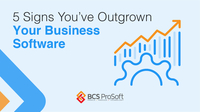More than ever the pressures of the market demand you do more with less. Principals and owners in every industry are constantly seeking to manage their business more effectively. They are seeking new ways to empower employees and innovate the way they do business in spite of:
- Limited resources (time, money and people)
- Increasing competition
- Shifting business demands
- An evolving marketplace
So how do you keep the pace? How do you ensure you have the right information to make the right decisions?
Your success depends on fully functioning solutions, and product upgrades are important enough that senior management needs to fully understand both the timing and project plan. You need to strike the right balance between regularly updating your software and minimizing cost and disruption to your business. This article provides advice on why upgrades are important and how to build an effective process for maintaining your asset.
The Importance of Upgrading Your System
Your service or maintenance plan helps you keep your software running smoothly through continued access to upgrades, updates, service packs, tax and regulatory updates that may be necessary, and more — all of which are exclusively available to customers on an active plan and are not available for legacy systems. Access to the publisher’s expertise of the software, services, and latest software updates means your staff have the tools they need to get the job done. Software vendors work to ensure the upgrades available for customers on a maintenance plan will improve ease-of-use in order to save you time, effort and expense, as well as a variety of new features and improvements that provide real efficiencies. By staying on the latest version, you have access to new features and capabilities and can help your business take advantage of new functionality and technology to stay ahead of your competitors. Upgrading your software can also help you:
Ensure Optimal Performance
Keeping your ERP software up-to-date improves the user experience and overall efficiency of the product. By staying current and installing all product updates, you’re helping to ensure that your software is running at optimal performance, while reducing employee downtime do to system slowdowns, user questions, and workarounds. Upgrades introduce performance and multiuser environment improvements and enhancements throughout your solution, allowing you to conduct everyday tasks in a fraction of the time.
Staying on an active maintenance plan ensure access to new features that focus on helping companies become more efficient in their daily tasks, allowing them to focus on growing their business. Since ERP upgrades should be tied to the core business strategy, they typically trigger process- and operation-level evaluations and subsequent improvements across business divisions. Upgrading your ERP systems allow you to easily implement business processes and workflow that are based on new industry best practices. They also allow you to optimize your Standard Operating Procedures to ensure that your entire workforce will adopt the new features in the system. Updates take time up-front, but they will help you save time in the long run.
Comply with Government Regulations
New legislation and regulations are continually being passed by both state and federal governments. Regulations such as Sarbanes-Oxley (SOX), IFRS, ISO, Bioterrorism Act, HIPPA, and the Affordable Care Act (ACA) have had a serious impact on many different industries and organizations. In addition, payroll and sales tax laws, as well has human resource regulations change frequently. If you utilize in-house payroll and/or human resource software then keeping up-to-date on software updates and upgrades is imperative. While some regulations do not require specific software, they do require that you comply with certain documentation and process standards and automated processes can help. There are also many industry specific certifications that are required or necessary to compete effectively. Software vendors continually update their solutions to help you with compliance challenges. Updates can help you comply with new regulations, while saving you significant resources, easing your certification process, and saving you from having to pay large fees or penalties for noncompliance.
Lower Total Cost of Ownership
While many companies focus on cutting costs in the short term, successful ones in today’s markets look to gain more traction in the future. Reducing Total Cost of Ownership (TCO) of your ERP system is certainly an important goal. It must be balanced, however, by the Total Value of Ownership (TVO) which can be demonstrated more intangibly by better service to customers and business partners, increased staff productivity, and limiting time spent on IT issues. These ERP upgrade strategies and best practices can easily outweigh all other factors.
While investing might sound counter intuitive (especially when optional), you can stay ahead of the curve by subscribing to software maintenance and support plans, keeping your systems running with the latest software features and functionality but without paying full price for upgrades. With each new version you should ask yourself:
- “Am I paying for redundant applications?”
The updated core functionality of your solution may address many items offered by your third-party products, custom reports, or software modifications. - “Will the upgrade disrupt my company?”
Understanding the benefits of upgrading and developing an upgrade implementation plan can assist executive management on setting the requirements of the upgrade and not divert attention from the strategic intent of the company.
Each upgrade project should be viewed as a focal point for a whole series of related improvements. At a minimum, this is an excellent time to consider implementing new capabilities and refreshing the technology environment, and can often be combined with other business and IT initiatives. Upgrades are an excellent time for you to evaluate your IT portfolios and look for opportunities to eliminate custom software, unneeded modifications, and even third-party or legacy systems in order to simplify your systems and lower costs of ownership.
Keep Up with Technology Advancements
The evolution of technology is as certain as death and taxes. Hardware, databases, operating systems (OS), servers, and all IT infrastructures are ever-evolving. It is unnecessarily costly to run your business on outdated software. Upgrades are necessary to support the latest servers, operating systems, hardware, and database technologies, ensuring that your system is supported and running at peak performance. Legacy systems that are no longer supported or maintained by the manufacturer will eventually fall behind in technology compatibility. Avoiding the maintenance premiums alone can help you realize significant savings.
Another significant area of risk is technological obsolescence. Hardware, operating systems, and databases tend to evolve faster than ERP systems. You must stay up to date to capitalize on the benefits of newer and more cost-effective technology. The monetary value of this risk increases dramatically if your business begins to face capacity constraints related to transaction throughput or data volumes. In some cases, upgrading may be the only way to ensure critical functions like order processing are not degraded. The upgrade also may allow IT to add needed capacity at a much lower cost.
ERP Upgrade Decisions Should Not Be Driven by IT
Your business management software delivers analytics and reporting functions that help you make informed decisions. To help you stay ahead, software updates and new versions are released that enhance the functionality, performance and usability of your solution. These updates ensure that you are able to manage new compliance issues and government regulations, further automate and streamline processes, and get visibility into the latest business intelligence metrics.
Upgrading your ERP system should not be seen as a mere IT initiative; but rather a strategic lever to leapfrog the competition by enabling integration, process standardization and improvement of operations across your organization. Upgrading your business management system is less about IT and more about business transformation.
While IT is an excellent resource to manage and develop ERP upgrade project plans, the decision whether or not to upgrade your business management software is not one that should be made by your IT department. Yes your system is key part of your IT strategy, but it’s also one of your most important corporate assets. It is vital to develop a company-wide strategy for how often the software and underlying technology will be updated so that the entire organization can plan and budget for the inevitable costs and disruptions.
Your systems should have at least a seven- to ten-year useful life, but over that time they will need to be maintained and enhanced to protect their value and serve the changing needs of your business. The key to minimizing the challenge of upgrades is to have both a long-term software life cycle strategy and a comprehensive tactical plan for the execution of timely upgrades.
The Bottom Line
The biggest challenge for executives heading an ERP upgrade project is to determine how to keep the upgrade simple, deployment short, and adoption of new functionality by end-users aligned to its goals and objectives. The key to meeting this challenge is to begin the project with a strategic plan and ensuring the plan takes long term care, maintenance, and updates into consideration.
Many analysts and an abundance of data indicate that more and more initial ERP implementations fail to meet stated objectives. So it’s understandable why many businesses are reluctant to do an upgrade, once their system is up and running. Protect your investment and continue to focus on business growth by keeping your business management system running smoothly and up-to-date. The difference between success and failure is strategic planning and project management.







